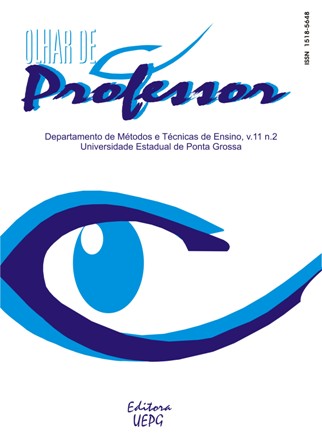O QUE OS PROFESSORES PENSAM SOBRE OS JOGOS DRAMÁTICOS? (WHAT DO THE PROFESSORS THINK ON THE DRAMATIC GAMES?) - Doi: DOI: http://dx.doi.org/10.5212/OlharProfr.v.11i2.383401
Main Article Content
Abstract
Inicialmente utilizado como recurso terapêutico, o jogo dramático apresenta-se na literatura como uma estratégia importante nas práticas pedagógicas que consideram o lúdico como algo fundamental no processo de ensino e aprendizagem. Questionamentos sobre a utilização desse recurso nas escolas de Educação Infantil desencadearam a pesquisa ora apresentada, que teve como objetivos mapear quantos professores de Educação Infantil de uma rede municipal do interior paulista (composta por 509 professores) utilizavam os jogos dramáticos e verificar que concepções eles tinham sobre esse recurso pedagógico. Tal estudo foi organizado em três etapas: a primeira etapa consistiu em um levantamento proposto aos professores atuantes na Educação Infantil da referida rede, por meio de um questionário devidamente estruturado; na segunda etapa fez-se a tabulação dos dados levantados, os quais, entre outros aspectos, revelaram que 21% dos participantes da pesquisa (107 professores) faziam uso dos jogos dramáticos em suas práticas diárias e 36% (183 professores) não utilizavam esse recurso; na terceira etapa realizou-se a análise das concepções dos professores que utilizavam os referidos jogos. É importante esclarecer que o questionário não foi respondido por 43% dos pesquisados (219 professores). Como resultado desse estudo, observou-se que o jogo dramático não é tão difundido entre os profissionais da área e que mesmo aqueles professores que afirmaram usá-lo em suas práticas educativas demonstraram certa fragilidade teórica ao responder às questões propostas, destacando-se que muitos podem não utilizar esse recurso por não conhecê-lo. Assim, espera-se que a pesquisa realizada possa contribuir para a difusão dessa estratégia de ensino, a qual é apontada como um recurso didático relevante e eficaz no processo de ensino e aprendizagem.
Palavras-chave: Jogo Dramático. Educação Infantil. Formação docente.
The dramatic game, initially used therapeutically by Moreno, is presented in literature as an important strategy in pedagogical practices that consider playful as something basic in the process of education and learning. In this direction, this study questioned if this practice has been used in the schools of Junior Education, and therefore it objectified to map how many professors of this modality of education from a municipal net on the countryside of São Paulo interior of 509 teachers used the dramatic games and which conceptions did they have on this resource. Thus, this work was organized in a way that the 1ª stage consisted of a survey by means of questionnaire structuralized next to the teachers of this level of education. The 2ª stage consisted of the tableau of the raised data, which had discovered, among others aspects, that 21% (107 teachers) had told to make use daily of the dramatic games, 36% (183 teachers) did not use this resource and 43% (219 professors) had not answered the questionnaire. The 3ª stage was the analysis of the conceptions only of those who used them. As a result of this study it was observed that this practical is not spread out among the professionals of the area and even those educative teachers who had told to use the dramatic games in its practices had demonstrated certain theoretical fragility when answering the questions. It’s important to point out that many teachers may not use this resource for not knowing it. Thus, one expects that this study contributes for the diffusion of this strategy of education, once that literature points it as an important didactic resource in the process teach-learning.
Keyword: Dramatical game. Infantile education. Teaching formation.
Downloads
Article Details
Authors who publish in this journal agree with the following terms:
a) Authors keep the copyrights and concede the right of its first publication to the magazine. The work piece must be simultaneously licensed on the Creative Commons Attribution License which allows the paper sharing, and preserves both the author identity and the right of first publication to this magazine.
b) Authors are authorized to assume additional contracts separately, to not-exclusively distribution of the paper version published in this magazine (e.g.: publish in institutional repository or as a book chapter), with the author identity recognition and its first publication in this magazine.
c) Authors are permitted and stimulated to publish and distribute their papers online (e.g.: in institutional repository or on their personal webpage), considering it can generate productive alterations, as well as increase the impact and the quotations of the published paper.
d) This journal provides public access to all its content, as this allows a greater visibility and reach of published articles and reviews. For more information on this approach, visit the Public Knowledge Project, a project that developed this system to improve the academic and public quality of the research, distributing OJS as well as other software to support the publication system of public access to academic sources.
e) The names and e-mail addresses on this site will be used exclusively for the purposes of the journal and are not available for other purposes.

This work is licensed under a Creative Commons Attribution 4.0 International License.





